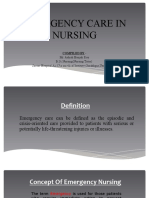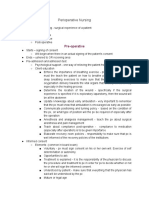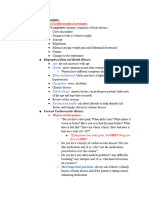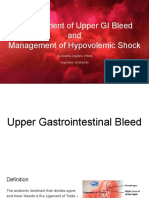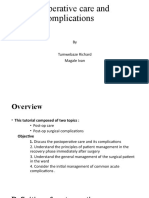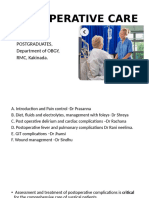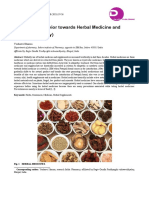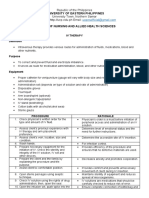Tara's Intro To Critical Care
Tara's Intro To Critical Care
Uploaded by
Tara McNeillCopyright:
Available Formats
Tara's Intro To Critical Care
Tara's Intro To Critical Care
Uploaded by
Tara McNeillOriginal Title
Copyright
Available Formats
Share this document
Did you find this document useful?
Is this content inappropriate?
Copyright:
Available Formats
Tara's Intro To Critical Care
Tara's Intro To Critical Care
Uploaded by
Tara McNeillCopyright:
Available Formats
Intro to Critical Care Nursing
Critical care areas are filled with stressors
● Loss of privacy
● Artificial lighting & Noise
● Lack of meaningful stimuli
● Pain
Types of Units
● ICU = Intensive Care Unit
○ Monitoring Needed
■ Continuous ECG
■ BP
■ O2 sat
■ Cardiac Output (Co)
■ Intracranial Pressure
■ Temperature
■ Cardiac Index (CI)
■ Stroke Volume (SV)
■ Stroke Volume Variation (SVV)
■ Ejection fraction
■ End-Tidal C02
■ Tissue O2 consumption
○ On going support by
■ Mechanical ventilators
■ Intra-Aortic balloon Pumps (IABPs)
■ Circulatory Assist Devices (CAD)
■ Dialysis Machines
● SICU = Surgical
● MICU= Medical
● CCU = Coronary Care Unit
● PACU = Post Anesthesia Care Unit
● IMCU = Intermediate Care Unit
● PCU = Progressive Care Unit (aka intermediate care or step-down units)
○ Transition b/t ICU and general care or discharge.
○ Are at risk for serious complications, but risk is lower than ICU patients
■ Cardiac Procedures
● Stent placement
■ Awaiting heart transplant
■ Rec’ing stable doses of vasoactive drugs
● Diltiazem ( Cardizem)
■ Weaned from prolonged Mechanical Ventilations
○ Monitoring in these units
■ Continuous ECG
■ Arterial BP
■ O2 sat
■ End-Tidal CO2
Rapid Response Teams (RRTs)
● Provides for the delivery of advanced care by an interprofessional team
○ critical care nurse, respiratory therapist, critical care physician or an advanced practice
RN
● RRTs bring rapid and immediate care to unstable patients in noncritical care settings
American Association of Critical-Care Nurses (AACN)
● Founded in 1969
● Largest specialty organization in world
● Influences critical care standards of practice
● Number one priority is education of critical care nurses.
● The AACN definition: “that specialty dealing with human responses to life-threatening problems.”
The AACN Standards of Professional Practice include:
I - Quality of care
II - Individual Practice Evaluation
III - Education
IV - Collegiality
V - Ethics
VI - Collaboration
VII - Research
VIII - Resource Utilization
Critical Care Patient
● Patients often exhibit early and subtle signs of deterioration (e.g., mild confusion, tachypnea) 6 to
8 hours before cardiac or respiratory arrest.
● A patient is generally admitted to the ICU for one of three reasons
○ FIRST: Patient may be physiologically unstable, requiring advanced clinical judgments by
nurse and HCP
○ SECOND: Patient may be at risk for serious complication and need frequent
assessments and often invasive interventions
○ THIRD: Patient may need intensive and complicated nursing support related to the use of
IV polypharmacy and advanced technology
■ sedation, thrombolytics, drugs requiring titration [vasopressor]
■ mechanical ventilation, intracranial pressure monitoring, continuous renal
replacement therapy, hemodynamic monitoring
● Patients can be clustered by
○ Disease condition
■ Neurology, Pulmonary
○ Age group
■ Neonate, Pediatrics
○ Acuity
■ acute and unstable vs. chronic but technology dependent
● Commonly treated patients in ICU:
○ Respiratory distress
○ Acute neurologic impairment
○ Myocardial infarction
○ Post-op heart surgery
○ Major surgical procedure
■ Organ transplant
○ Trauma
○ Burns
○ Medical emergencies
■ sepsis, DKA, drug overdose, thyroid crisis
● Those not expected to recover are not admitted
○ pt in a persistent, vegetative state or to prolong the natural process if death
● Nonsurvivors in ICU are older, have comorbidities and experience longer ICU stays.
○ liver disease, obesity
Common Problems of Critically ill Patients
● Often intubated and mechanically ventilated
● Prolonged immobility
● High risk for skin problems and venous thromboembolism
● Health care-associated infections (HAIs)
○ Predisposed/t use of multiple invasive devices
● Sepsis and multiple organ dysfunction syndrome may follow
● Special problems
○ anxiety, pain, impaired communication, sensory-perceptual problems, sleep and nutrition
can occur
Nutrition problems when arriving or staying in ICU
● Inadequate nutrition is linked to increase morbidity
○ I.E. enteral feeding interruptions d/t need to give meds or for test & procedures.
● Hypermetabolic states
○ characterized by increased blood pressure and heart rate, peripheral insulin resistance,
and increased protein and lipid catabolism, which lead to increased resting energy
expenditure, increased body temperature, total body protein loss, muscle wasting, and
stimulated synthesis
○ burns, sepsis
● Catabolic states
○ Characterized by fatigue, low energy levels, exercise intolerance, and a reduction in your
ability to handle any kind of stress leading to the breakdown or losing overall mass, both
fat and muscle.
○ acute kidney injury
● Severely malnourished states
○ chronic heart, pulmonary, or liver disease
● Determining whom to feed, what to feed, when to feed, and how to feed (route) is crucial when
caring of a critically ill patients
● Primary goal of nutritional support:
○ Prevent or correct nutritional deficiencies
■ Early provision of enteral nutrition or parenteral nutrition
● Enteral nutrition
○ Delivery of calories via GI tract
○ Preserves the structure and function of the gut mucosa and stop
the movement of gut bacteria across the intestinal wall and into
the bloodstream
○ associated with fewer complications and shorter hospital stay
○ Less invasive than parenteral nutrition
● Parenteral nutrition
○ IV delivery of calories
○ Used when enteral route cannot provide adequate nutrition or is
contraindicated
■ paralytic ileus, diffuse peritonitis, intestinal obstruction,
pancreatitis, GI ischemia, abdominal trauma or surgery,
and severe diarrhea
Anxiety
● Primary source:
○ Perceived or anticipated threat to health or life, loss of control of body functions, and an
environment that is foreign
● Pain, impaired communication, sleeplessness, immobilization and loss of control all enhance
anxiety
● Reduce anxiety:
○ Express concerns, ask questions, and state their needs.
○ Include pt and caregiver in all conversations and explain the purpose of equipment and
procedures.
○ Encourage caregivers to bring photographs and personal items.
○ Appropriate use of antianxiety meds (lorazepam [Ativan]) and relaxation techniques
(music therapy) may reduce stress response
Pain
● Inadequate pain control is often linked with agitation and anxiety = adds to stress
● Patients who are at high risk for pain:
○ Medical conditions that include ischemic, infectious, or inflammatory process
○ Immobilized
○ Have invasive monitoring device (endotracheal tubes)
○ Require invasive or noninvasive procedures
● Critically ill patients (those intubated) → continuous IV sedation → Propofol [Diprivan] or for pain
and sedation → Analgesic agent fentanyl [Sublimaze]
■
Be alert that this prevents full neuro status assessment
● Guidelines should include a daily, scheduled interruption of sedation →
“Sedation Holiday” to allow a neuro exam
Impaired Communication
● Especially patients with an ET tube, those who can not speak because of sedative and paralyzing
drugs
● Explore other methods of communication
○ Picture board, Notepads, Magic slates, Computer keyboards
● When speaking w/ pt à look directly at the patient and use hand gestures when appropriate
● Use approved interpreter if pt or caregiver does not speak english
● Nonverbal communication is important
● High levels of procedure-related touch and lower level of comfort-related touch
○ If appropriate, use comforting touch with ongoing evaluation of the patient’s response
○ Encourage caregivers to touch and talk with the patient even if the patient is
unresponsive
Sleep problems
● Nearly all patients in ICU have sleep disturbance
○ associated with delirium and delayed recover
● Arrange the environment to promote the patient’s sleep-wake cycle
· Strategies include:
○ Scheduling rest periods
○ Dimming lights at nighttime
○ Providing eye masks and or ear plugs
○ Opening curtains during daytime
○ Getting physiologic measurements w/o disturbing the pt
○ Limiting noise
○ Providing comfort measures → massage
○ Benzodiazepines
Temazepam[Restoril]
benzo-like drugs zolpidem [Ambien]
Sensory/Perceptual problems
● Acute and Reversible
● Alterations in consciousness
Delirium aka ICU psychosis
● NOT dementia
● Alterations in mentation
○ delusions, short attention span, loss of recent memory
● Psychomotor behaviors
○ restlessness, lethargy
● Sleep-wake cycle
○ daytime sleeping, nighttime agitation
Risk Factors:
● Pre Existing dementia, history of baseline hypertension or alcohol abuse, and severe illness on
admission
● Environmental factors
○ sleep deprivation, anxiety, sensory overload, and immobilization
● Physical conditions
○ hemodynamic instability, hypoxemia, hypercarbia, electrolyte disturbances, and severe
infections
● Certain drugs
○ Sedatives (benzo), analgesics (opioids), and antimicrobials (aminoglycosides)
Nursing Interventions
● Monitor all patients for delirium
● Address/Correct physiologic factors
○ Oxygenation, Perfusion, and electrolyte problems.
● Help orient patient
○ Use of clocks and calendars
● If experiencing hyperactivity, insomnia or delusions → tx with sedative drugs with anxiolytic
effects
○ Dexmedetomidine ( Precedex)
● Presence of Caregiver can help orient and reduce agitation
● Last → Introduction of early mobility protocols can help reduce agitation
● For Sensory overload
○ Limit noise and assist the patient in understanding noises that cannot be prevented
○ Find a suitable place for patient-related discussions
■ Adds stress if pt is being talked about in front of pt but pt doesn't have input
○ Muting phones, setting alarms based on the patient’s condition, and reducing
unnecessary alarms.
■ Silencing BP alarm when handling invasive lines and then reset the alarm when
done
■ Silence ventilator alarms when suctioning
○ Last → limit overhead paging
Psychosocial Suppor
● Involving the family increases the patient’s outcome
● Caregivers play a valuable role in the patient’s recovery and are members of the interprofessional
care team
● Identify a spokesperson for the family to help coordinate information exchange between the
interprofessional care team and family
● Evaluate the appropriateness of including caregivers in rounds and patient care conferences.
○ It helps with acceptance and coping with problems when they see that the team is caring
and competent
● Limiting visitation does NOT protect the patient from adverse physiologic consequences.
○ AACN strongly recommends less restrictive, individualized visiting policies
Ethical Considerations
4 Ethics Principles:
● Respect for autonomy → right to make decisions
● Nonmaleficence → not harming a patient
● Beneficence → helping a patient
● Justice → treating patients equally
Cultural Competence
● Ensures individual differences r/t culture are incorporated into the plan of care
● Often meeting the patient’s physiologic needs is a priority and overshadows the influence of the
patient’s culture on the illness experience
● Telling some pt’s that they are dying as a way of letting them prepare for death may impose on
the family’s role.
You might also like
- COULTER (H.L.) - Vaccination Social Violence & Criminality (1990)Document318 pagesCOULTER (H.L.) - Vaccination Social Violence & Criminality (1990)andbenwaspreservationagent100% (2)
- ER NursingDocument29 pagesER NursingDonalyn Amahan100% (6)
- Presentation On Care of Critically Ill PatientDocument9 pagesPresentation On Care of Critically Ill Patientanamika sharmaNo ratings yet
- PLAB Part 2 Is Not A Difficult Exam!!! PLAB Part 2Document9 pagesPLAB Part 2 Is Not A Difficult Exam!!! PLAB Part 2jahangirealam100% (1)
- JCI 2017 IPSG Infographic 062017Document1 pageJCI 2017 IPSG Infographic 062017Hanifah Fitroh100% (5)
- 2021 AHA ASA Guideline For The Prevention of Stroke in Patients With Stroke and TIA Clinical UpdateDocument43 pages2021 AHA ASA Guideline For The Prevention of Stroke in Patients With Stroke and TIA Clinical Updatejulioel1nico20100% (1)
- Care of A Critically Ill PatientsDocument4 pagesCare of A Critically Ill Patientsdeysagnik87No ratings yet
- Management of Critically Ill Patients in The ICUDocument55 pagesManagement of Critically Ill Patients in The ICUkader abdiNo ratings yet
- ORAL REVALIDADocument4 pagesORAL REVALIDAlopez.atashaellaNo ratings yet
- Nursing Management of Criticallyill Patient: Prepared By: Ms Mononita Bhattacharjee (M.SC Medical Surgical Nursing)Document35 pagesNursing Management of Criticallyill Patient: Prepared By: Ms Mononita Bhattacharjee (M.SC Medical Surgical Nursing)priyagerardNo ratings yet
- Introduction To IcuDocument41 pagesIntroduction To IcuzhaimeangirlNo ratings yet
- Rle 218 - Er Concept NotesDocument47 pagesRle 218 - Er Concept NotesjeaNo ratings yet
- 01.Preoperative Anesthetic AssessmentDocument20 pages01.Preoperative Anesthetic Assessmentbldylayla1422No ratings yet
- ECT Clinical GuidelinesDocument25 pagesECT Clinical GuidelinesAlvarez, Ella Mae R.No ratings yet
- Penanganan P (Asien Di Instalasi Gawat Darurat (IgdDocument25 pagesPenanganan P (Asien Di Instalasi Gawat Darurat (IgdjoyfullNo ratings yet
- Presentation Postop CareDocument60 pagesPresentation Postop Caresiti syazanaNo ratings yet
- Icu PDFDocument58 pagesIcu PDFVidit SoniNo ratings yet
- Emergency Care in NursingDocument32 pagesEmergency Care in NursingPauline Añes100% (1)
- Perioperative Nursing Reviewer Part 3Document13 pagesPerioperative Nursing Reviewer Part 3JUDE MARIANO JR. ALBANCES CARLOSNo ratings yet
- Med-Surg Exam #3 Study GuideDocument43 pagesMed-Surg Exam #3 Study GuideCaitlyn BilbaoNo ratings yet
- Anesthesia CasesDocument19 pagesAnesthesia Casesالدعوه الحسنهNo ratings yet
- Introduction To ICUDocument68 pagesIntroduction To ICUgeleta.dima2013No ratings yet
- Pre and Postop Period - 240318 - 200909Document26 pagesPre and Postop Period - 240318 - 200909hh3245064No ratings yet
- Emergency Nursing TeachingDocument32 pagesEmergency Nursing TeachingBrian Jay Enriquez Calibot100% (1)
- Nursing The Icu PatientsDocument31 pagesNursing The Icu PatientsInnocentNo ratings yet
- Geriatrics ReviewDocument32 pagesGeriatrics Reviewshellers24No ratings yet
- 10 Nephro Nursing - Renal Replacement TherapiesDocument55 pages10 Nephro Nursing - Renal Replacement TherapiesALLAINE MARIE TANNo ratings yet
- M3 - Didactic - NCM 118Document5 pagesM3 - Didactic - NCM 118KARL FESARITNo ratings yet
- Accidentemergency 110315155436 Phpapp02Document50 pagesAccidentemergency 110315155436 Phpapp02Keziah GillNo ratings yet
- Pre - OperativeDocument11 pagesPre - OperativeVelpulakavyasree SonuNo ratings yet
- CME UGIB, Hypovolemic Shock 31.12.21 - FINALDocument58 pagesCME UGIB, Hypovolemic Shock 31.12.21 - FINALThayalan RaviNo ratings yet
- Medical Emergenceies in Dental PracticeDocument31 pagesMedical Emergenceies in Dental PracticeAbdullahNo ratings yet
- Concept of Criticalcare Nursing-1Document70 pagesConcept of Criticalcare Nursing-1victor100% (1)
- Perioperative Nursing Care 1Document38 pagesPerioperative Nursing Care 1realynpacatang01No ratings yet
- Care of Critically Ill Patient:: Johny Wilbert, M.SC (N)Document40 pagesCare of Critically Ill Patient:: Johny Wilbert, M.SC (N)Nancy SinghNo ratings yet
- Differntiate BetweenDocument62 pagesDifferntiate Betweenusatesting21No ratings yet
- Anesthesia RecoveryDocument18 pagesAnesthesia RecoveryBlueyNo ratings yet
- Daycare SurgeryDocument39 pagesDaycare SurgeryA. TivieanNo ratings yet
- Perioperative Nursing Care 2021Document113 pagesPerioperative Nursing Care 2021Akech AlbertoNo ratings yet
- MergeResult 2024 07 11 08 35 08Document46 pagesMergeResult 2024 07 11 08 35 08AKASH C sannakkiNo ratings yet
- Triage in Polytauma: Prof. Dr. A. Chandrasekaran M.S., PH.D.Document73 pagesTriage in Polytauma: Prof. Dr. A. Chandrasekaran M.S., PH.D.ShrutiNo ratings yet
- TRIAGEDocument9 pagesTRIAGEJohn Paul TogadoNo ratings yet
- 7-Postoperative Care and ComplicationsDocument25 pages7-Postoperative Care and ComplicationsAiden JosephatNo ratings yet
- 17-CardiopulmonaryDocument27 pages17-Cardiopulmonaryabduh.garmanNo ratings yet
- Thyroid DisordersDocument33 pagesThyroid Disordersjxxzrtvrb9No ratings yet
- Emergency NursingDocument5 pagesEmergency NursingmirageplayerNo ratings yet
- DR Lila - Patient Preparation For Emergencies Surgeries - New 11012017Document37 pagesDR Lila - Patient Preparation For Emergencies Surgeries - New 11012017bloadyroar100% (1)
- Critical Care NursingDocument95 pagesCritical Care NursingHiba V.ANo ratings yet
- Post Operative Complications and Their ManagmentDocument21 pagesPost Operative Complications and Their ManagmentMaira PervezNo ratings yet
- Introduction to IcuDocument3 pagesIntroduction to IcuGeeta BelbaseNo ratings yet
- Medical Surgical NursingDocument76 pagesMedical Surgical NursingARIANE DOLINONo ratings yet
- Pre-Operative Nursing CareDocument79 pagesPre-Operative Nursing CarePeter FrimpongNo ratings yet
- Medical Emergencies in Dental Setting Student LectureDocument50 pagesMedical Emergencies in Dental Setting Student LecturesaeedhaneyahNo ratings yet
- Pharm Safety AlertsDocument10 pagesPharm Safety AlertsHope RobersonNo ratings yet
- Peri-Operative NursingDocument61 pagesPeri-Operative NursingAINA SHANE SAMANIEGONo ratings yet
- SS Hour - Pre-Operative Care - 1670891305Document51 pagesSS Hour - Pre-Operative Care - 1670891305Pediatrics SLCM-WHQMNo ratings yet
- Critical Care NursingDocument41 pagesCritical Care NursingAbirajan50% (2)
- Criticalcare Designandfacilities 170412044012Document34 pagesCriticalcare Designandfacilities 170412044012Vinay SahuNo ratings yet
- Peri-Operative CareDocument13 pagesPeri-Operative Carevindula10No ratings yet
- final post op careDocument117 pagesfinal post op careSatwika071No ratings yet
- CPPT 3.2 - Cardiac Conditions EvaluationDocument11 pagesCPPT 3.2 - Cardiac Conditions Evaluationbernardof7388No ratings yet
- General Anesthesia: Osama Ali Ibraheim, MDDocument51 pagesGeneral Anesthesia: Osama Ali Ibraheim, MDalhada azofit almaNo ratings yet
- Sylvias Final Case StudyDocument27 pagesSylvias Final Case Studyapi-609381734No ratings yet
- Critical Care Common Conditions: Critical Care EssentialsFrom EverandCritical Care Common Conditions: Critical Care EssentialsNo ratings yet
- Tara's CH. 64 Arthritis and Connective Tissue DisordersDocument34 pagesTara's CH. 64 Arthritis and Connective Tissue DisordersTara McNeillNo ratings yet
- Case Study 1 - Head InjuryDocument9 pagesCase Study 1 - Head InjuryTara McNeillNo ratings yet
- Tara's Anatomy and Physiology - Aehlert ECGs Made EasyDocument16 pagesTara's Anatomy and Physiology - Aehlert ECGs Made EasyTara McNeillNo ratings yet
- ECG Fast and Easy PPDocument38 pagesECG Fast and Easy PPTara McNeillNo ratings yet
- 2 - Introduction To VirusesDocument32 pages2 - Introduction To VirusesrostandtchangoueNo ratings yet
- Clerkship ManualDocument9 pagesClerkship ManualCCMC HESUNo ratings yet
- Inferior Myocardial InfarctionDocument25 pagesInferior Myocardial InfarctionAkbar IskandarNo ratings yet
- H&P Cardio-Pul-Abd Checklist 2006Document6 pagesH&P Cardio-Pul-Abd Checklist 2006lindseyNo ratings yet
- How To Spot A Pathological LiarDocument10 pagesHow To Spot A Pathological LiarBharat ShahNo ratings yet
- RPM Employee Benefitguide 2023Document16 pagesRPM Employee Benefitguide 2023kcrow.bizNo ratings yet
- 2019 Advocacyhandbook Final Web VersionDocument256 pages2019 Advocacyhandbook Final Web VersionJHNo ratings yet
- Reaction Paper On COVID-19Document2 pagesReaction Paper On COVID-19Kiarana Fleischer75% (4)
- Sample Online Second Opinion - DR Vineet Govinda Gupta OncologyDocument3 pagesSample Online Second Opinion - DR Vineet Govinda Gupta Oncologychotusankha.0204No ratings yet
- Godavari College of Nursing, Jalgaon: Daily Clinical Dairy ReportDocument6 pagesGodavari College of Nursing, Jalgaon: Daily Clinical Dairy ReportbuntyNo ratings yet
- Kannangara Memorial LectureDocument77 pagesKannangara Memorial Lectureansaf0% (1)
- Stem Cells in OrthodonticsDocument4 pagesStem Cells in OrthodonticsInternational Journal of Innovative Science and Research Technology100% (1)
- Test Blueprinting II: Creating A Test BlueprintDocument10 pagesTest Blueprinting II: Creating A Test BlueprintDr. Doaa El MorsiNo ratings yet
- Contoh - IWO-Candidate Intake FormDocument6 pagesContoh - IWO-Candidate Intake FormEwik SuarningsihNo ratings yet
- 2022 Updated SLCC Sing Safely Guidelines - 1.07.22 - FINAL - 20220108175728Document3 pages2022 Updated SLCC Sing Safely Guidelines - 1.07.22 - FINAL - 20220108175728Adrielle AruyaNo ratings yet
- Consumer Behavior Towards Herbal Medicine and Practices (Survey)Document20 pagesConsumer Behavior Towards Herbal Medicine and Practices (Survey)amitku mandalNo ratings yet
- Final STG 2022Document1,752 pagesFinal STG 2022amanabduwahabNo ratings yet
- Case NCP MelbaDocument2 pagesCase NCP MelbabambheesyeoboNo ratings yet
- Cancer:: by Lauren Gerstmann, MPHDocument3 pagesCancer:: by Lauren Gerstmann, MPHlalaine nadulpitNo ratings yet
- CKD Case PresentationDocument25 pagesCKD Case PresentationMohamed Anwer NaleefNo ratings yet
- PDF DIR 456Document6 pagesPDF DIR 456Fauzan MaulanaNo ratings yet
- IV TherapyDocument7 pagesIV TherapyJerika Shane MañosoNo ratings yet
- Control Bleeding - Lesson Plan Final - C168W003 VR 1.1Document23 pagesControl Bleeding - Lesson Plan Final - C168W003 VR 1.1RICHIEBRUSHIANo ratings yet
- Help With Health Costs: Can You Get Help With The Cost ofDocument42 pagesHelp With Health Costs: Can You Get Help With The Cost ofkhlodiaNo ratings yet
- Atrial FibrillationDocument55 pagesAtrial FibrillationNikhil Kumar100% (1)
- Joseph Crussiah Crussiah Crussiah Paula Xinis U.S. Court Inova MedstarDocument21 pagesJoseph Crussiah Crussiah Crussiah Paula Xinis U.S. Court Inova Medstarjoseph crussiahNo ratings yet

















